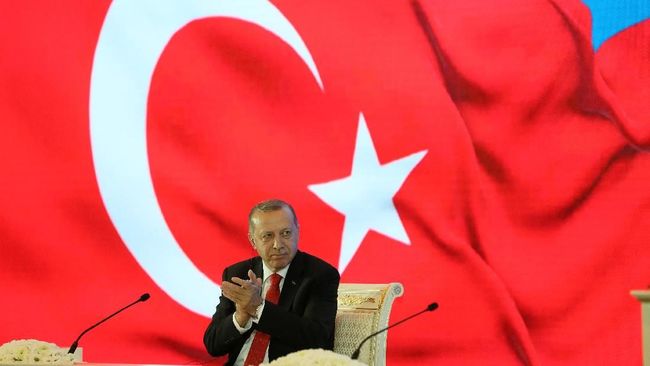Jakarta, CNBC Indonesia – President Recep Tayyip Erdogan said Turkey is fighting for its economic independence.
“We are seeing the game they are playing on currency, interest and price increases … and it shows our desire to continue our own game plan,” he said.
“We will emerge victorious from this ‘war of economic independence’ with the help of God and the people,” he added.
For this, Erdogan took an aggressive policy by supporting his central bank, Türkiye Cumhuriyet Merkez Bankası (TCMB) in cutting interest rates, even though inflation was high.
TCMB again cut its benchmark interest rate by 100 basis points to 15% last Thursday. As a result, the lira fell further against the United States (US) dollar.
Under the leadership of Governor Sahap Kavcioglu, TCMB has cut interest rates by 400 basis points since last September to 15%, whereas inflation in Turkey is now almost 20%. As a result, when interest rates are lower than inflation, the currency sinks.
As a result, the currency crisis hit Turkey again. The lira had fallen more than 18% against the United States (US) dollar to 13,491/US$ which was the weakest level in history as of last Tuesday (25/11/2021).
TCMB’s anti-mainstream policies follow Erdogan’s anti-high interest rates. The central bank usually raises interest rates when inflation is high, but TCMB has taken the opposite policy.
Kavcioglu views high interest rates as “the culprit of the devil”. This is in accordance with Erdogan, because if the TCMB governor has a different view, it will lead to his dismissal.
Before Kavcioglu, the Governor of TCMB was Naci Agbal, who served for only five months, from November 2020 to March 2021. Under Agbal’s era, the Turkish lira exchange rate was very powerful.
The lira has weakened since 2018 and was at its weakest on record in November last year. However, when Agbal started to raise interest rates slowly the lira rose, recording a 24% gain from a record low.
Turkey Crisis Threat: Rush Money
The fall in the lira exchange rate could have a wider impact on Turkey. Inflation in Turkey is currently close to 20%, with inflation as high as that, the real yield on 10-year bonds is negative.
This of course will not attract investors to invest in Turkey. Turkey’s 10-year tenor yield is now the lowest compared to other emerging market countries.
Thus, it will be difficult for Erdogan to get financing from bond issuance. Moreover, if the lira continues to fall, analysts estimate that inflation could reach 30%, while the real yield will of course be increasingly negative.
High inflation will then reduce people’s purchasing power. This of course has an impact on economic growth.
Not taking a policy to raise interest rates makes it difficult to cool inflation. Prices of basic necessities in the country of 85 million continue to soar.
Meanwhile salaries in local currency are highly devalued. Turkey’s minimum wage was worth around $380 in January and, with yesterday’s volatility, wages have shrunk to $224.
The decline in the lira is also believed to have a significant impact on the country’s debt. According to ratings agency Fitch, as of August 57% of Turkey’s central government debt was linked to foreign currencies or denominated.
This means paying off the debt will become more painful as the lira continues to fall in value. In addition, a bigger crisis is said to arise in the event of a money rush. This is a condition when there is a massive withdrawal of money by the public.
(roy/roy)
– .


